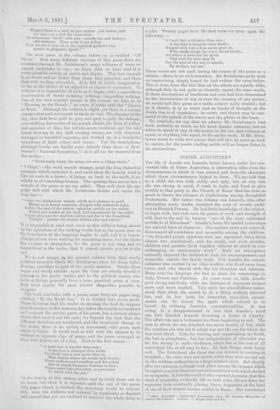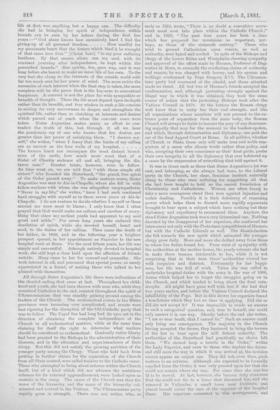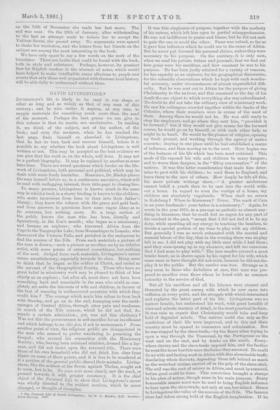SISTER AUGUSTINE.*
THE life of Amalie von Lasaulx, better known under her con- ventual title of Sister Augustine, is interesting alike from the circumstances in which it was passed, and. from the character which those circumstances helped to form. We are told that as a child she was both sickly and ugly, but at any rate she was strong in mind, if weak in body, and lived to give trouble to that party in the Church of Rome that has done so much to hinder the advance of Catholicism among thoughtful Protestants. Her father was Johann von Lasaulx, who, after attempting many trades, accepted the post of county archi- tect in Rhenish Prussia. He had little knowledge of the subject, to begin with, but such were his power of work and strength of will, that in the end he became "one of the most celebrated. architects of Rhineland." Amalie's home life tended to develope her natural force of character. Her mother, stern and reserved, discouraged all confidence and sympathy among the children. " On disputed points opinions were not expressed, but a strict silence was maintained ; and for weeks, and even months, children and parents lived together without so much as ever exchanging an unnecessary word." Such an atmosphere naturally disposed the children to look for encouragement and sympathy outside the family circle. For Amalie, the outside influence was exerted by an elder brother, who lived away from home, and who shared with her his thoughts and interests. Many were the longings she had to share his wanderings in Italy, Greece, and Palestine. As years went on, little Amalie grow strong and lively, while her firmness of character became more and more marked. Very early her schoolfellows under- stood that when she meant to do a thing nothing deterred her, and in her taste for somewhat masculine amuse- ments can he traced the spirit which refused to be bound by ordinary feminine conventionalities. It was owing to a disappointment in love that Amalie's mind was first directed towards becoming a Sister of Charity. The affair was not a fortunate one from beginning to end. The man to whom she was attached was never worthy of her, while the vocation she was led to adopt was not the one for which she was most fitted. Gifts for nursing and organisation, no doubt, she had in abundance ; but her independence of character was far too • strong' to make obedience, which lies at the root of all conventual life, at all easy to her. At first, things went fairly well. The Sisterhood she chose was one devoted to nursing at hospitals ; the rules were not severe, while they were carried out by the existing authorities in a large-minded spirit. But shortly after her entrance, a change took place among the inmates which brought in a spirit of narrowness and asceticism with which she had. no sympathy. It is to the creditor all concerned , however,that this: want of sympathy, evidently felt on both sides, did not deter her superiors from eventually placing Sister Augustine at the head of one of their branch houses settled at Bonn. Her conventual • Sister Augustine Authorieed Tratudalion front the Gorman Memorials of Amalie von Immix. London C. Kogan Paul and Co.
life at first was anything but a happy one. The difficulty she had in bringing her spirit of independence within bounds can be seen by her letters during the first few years :—" God alone knows how excessively hard I find, the
giving-up of all personal freedom How needful for my passionate heart that the fetters which bind it be wrought of that same love that" [Christ bore] "to my poor suffering brethren. By that means alone can my Eioul, with its constant yearning after independence, be kept within the prescribed bounds." Her spirits, too, gave way, and it was long before she learnt to make an inner 'life of her own. To the very last she clang to the interests of the outside world with far too much zest for her peace of mind. The more entire the surrender of such interest when the final step is taken, the more complete will be the peace that is the key-note to conventual happiness. A. convent is not the place for wide sympathies or breadth of thought. There the life must depend upon its depth rather than its breadth, and true wisdom in such a life consists in seizing its very narrowness to deepen and strengthen the spiritual life, rather than in clutching at interests and desires which passed out of reach when the convent vows were taken. Sister Augustine makes many an effort to con- tradict the truth of this, but through it all we hear the passionate cry of one who knows that her desires are greater than her power of satisfying them. "I deceive my- self," she writes, "when -I fancy that the limits of my calling
are as narrow as the four walls of my hospital The human heart can encompass the most distant bound- aries of the earth, how much more must that of a Sister of Charity embrace all and all, bringing the diss tance near." Greater trials, however, were to follow. As Lime wont on, we are told that "with those simple old sisters" who founded the Sisterhood, "the grand, free spirit of the Order passed away." To make matters worse, Sister Augustine was sent to Aix-la-Chapelle, where she fell in with fellow-workers with whom she was altogether unsympathetic. "Never in my life," she writes, "have I had such continued hard struggles with myself as in those seven years at Aix-la- Chapelle. I do not venture to decide whether I myself or those around me were most to blame ; I only know that I often prayed that God would make me callous, and careless of every- thing that since my earliest youth had appeared to my soul great and noble." For seven long years she endured this desolation of spirit, while she devoted herself, heart and soul, to the duties of her calling. Then came the death of her father; in 1848, and in the following year a brighter prospect opened, in her appointment as Superior to the new hospital work at Bonn. For the next fifteen years, her life was simple and uneventful. Athough entirely devoted to hospital work, el]e still kept a close hold upon the affection of friends outside. Many came to her for counsel and sympathy. She took interest in all, and possessed that special power, so surely appreciated in a friend, of making those who talked to her pleased with themselves.
All through Sister Augnstine's life there were indications of the clouded ending that came at last. Throughout her child- hood and youth, she had been thrown with men who, while they remained Catholics to the end, resisted throughout the spirit of Ultramontanism that was steadily gaining ground among the leaders of the Church. The ecclesiastical events in the Rhine provinces were becoming very complicated, and events were fast ripening for the disruption of the Old Catholic party that was to follow. The Papal See had long had its eyes set in the direction of obtaining the complete independence of the Church in all ecclesiastical matters, while at the same time claiming for itself the right to determine what matters should be considered as ecclesiastical. Gradually entire liberty had been granted to the Bishops in the administration of their dioceses, and in the education and superintendence of their clergy. But this did not satisfy the growing ambition of the younger party among the Clergy. Those who held back from putting in further claims for the separation of the Church from all State control, were called traitors to the Catholic cause. Those who attempted to bring about reforms within the Church itself, but of a kind which did not advance the ambitious schemes for its external aggrandisement, were looked upon as enemies in the camp. The cause of the Church was then the cause of the hierarchy, and the cause of the hierarchy cul- minated and Centred in the Vatican. The Ultramontane party rapidly grew in strength. There was one writer, who, as early as 1824, wrote, " There is no doubt a convulsive move- ment must soon take place within the Catholic Church ;" and in 1829, " The past four years has been a time which has prepared for revuleions as important, per- imps, as those of the sixteenth century." Those who tried to ground Catholicism upon reason, as well as authority, were hated and reviled, to spite of the Bishopa and clergy of the Lower Rhine and Westphalia showing sympathy and approval of the effort made by Hermes, Professor of Dog- matics at Bonn, to reconcile the conflicting claims of authority and reason, he was charged with heresy, and his system and. writings condemned by Pope Gregory XVI. The Ultramon- tane party had command of the citadel, and. those attacked made no stand. All but two of Hermes's friends accepted the condemnation, and, although protesting strongly against the illegal way in which it was obtained, they took the same course of action that the protesting Bishops took after the Vatican Council in 1870. At the bottom the Roman clergy well know that in uuity lies their real strength, and like all organisations whose members will not proceed to the ex- treme point of separation from the main body, the Roman. Church will always be liable to become the prey of any domineer- ing majority that may for the moment be the loudest-spoken, and which, through determination and diplomacy, can gain the ear of the final Appeal Court at Rome. In all politics, whether of Church or State, those only will make true and noble sup- porters of a cause who choose truth rather than policy, and who, accepting their own conscience as their final guide, prefer their own integrity to all the diplomacy that ever bolstered up a cause by the suppression of everything that told against it.
It was in times such as these that Sister Augustine's lot was cast, and belonging, as she always had done, to the Liberal party in the Church, her clear, feminine instinct naturally clung to those who were suffering for supporting all that she had been taught to hold as the sacred foundation of Christianity and Catholicism. Women are often found to take a more courageous stand than men against injustice and unfair dealing. Possibly it is their deficiency of reasoning power which helps them to discard more rapidly arguments brought to bear upon a subject which have nothing but their diplomacy and expediency to recommend them. Anyhow, the stand Sister Augustine took was a very determined one. Nothing daunted by the disapproval of her superiors, she continued her intercourse not only with the Protestant sympathisers of Hermes, but with the Catholic Liberals as well. The dissatisfaction. she felt towards the new spirit which animated the younger clergy grew daily. More and more she drifted away from those to whom her duties bound her. From want of sympathy with the authorities at the mother-house, the yearly retreats she had to make there became intolerable to her, while it is not surprising that in their turn those* authorities viewed her with suspicion and distrust. Fortunately for her happi- ness, her life was full of work. Twice she was called to undertake hospital duties with the army in the war of 1866, duties which helped her to forget the struggles going on in the Church, and which tended to bring about the final cata- strophe. All might have gone well with her, if she had died two years earlier, and before the Vatican Council declared the infallibility of the Pope. But in this decree her superiors found a touchstone which they lost no time in applying. Did she or did, she not accept it? It was impossible to evade an answer to such a categorical question, and, true to herself, she could only answer it in one way. Shortly before the end she writes, "I am so near death, that I cannot lie." Such an answer could only bring one consequence. The majority in the Church having accepted the decree, they hastened to bring the terrors of the law to bear upon the still defiant minority. The authorities of the Sisterhood, had practically no choice left them. "We cannot keep a heretic in the Order," writes the Lady Superior, and even to those who deplore the decree and still more the way in which it was arrived at, the decision cannot appear an unjust one. They did not, even then, push matters to an extreme. Although she expected to be formally expelled from the Order, it was only pressed upon her that she could not remain where she was. For some time she was too ill to be moved. At last, however, she became f ally conscious that she could not die in a home that disowned her, and she removed to Vallendar, a small town near Cobientz, and placed herself under the care of the superior of the hospital there. Her superiors consented to this arrangement, and.
on the 14th of November she made her last move. The end was near. On the 28th of January, after withstanding to the last an attempt made to induce her to accept the Vatican decree, she passed away. No arguments were spared to shake her resolution, and the letters from her friends on the subject arc among the most interesting in the book.
We have only space :to say a few words on the work of the translator. There are faults that could be found with the book, both in style and substance. Perhaps, however, its greatest flaw for English readers is the absence of notes, which would have helped to make intelligible many allusions to people and events that only those well acquainted with German local history will be able fully to understand without them.




































 Previous page
Previous page